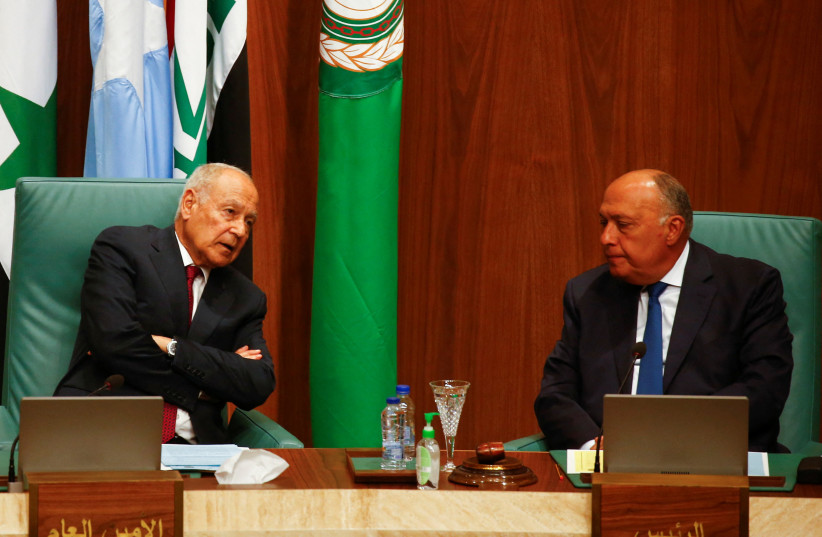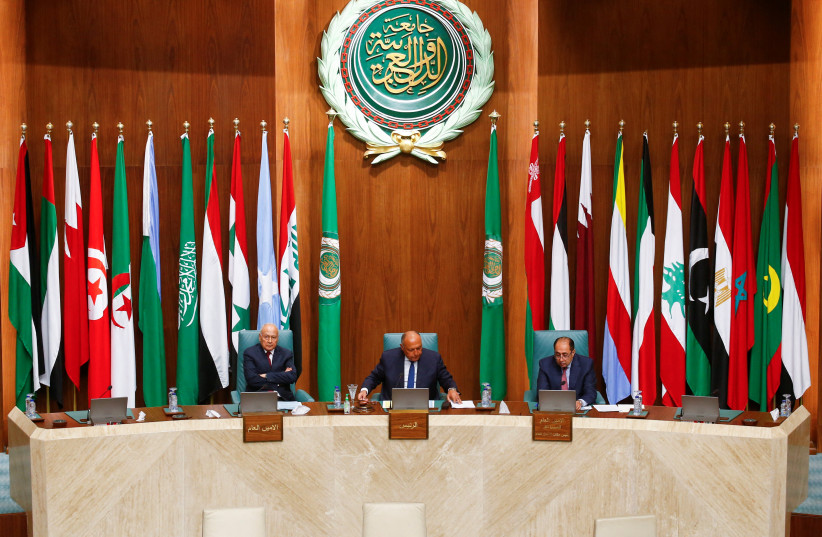The return of Syria to the Arab League is a symbolic turning point, bookending the Arab Spring and part of a new diplomatic era in the region, with the potential to hand over a win to Iran and Russia

Syria is positioned to return to the Arab League after members of the group voted to allow the country to return on Sunday.
The member states are interested in some movement to resolve the conflict in Syria, which dates back over a decade – to the 2011 “Arab Spring” – and has cost hundreds of thousands of lives and created one of the world’s worst humanitarian crises.
The countries want some kind of movement to help hundreds of thousands of displaced refugees, especially those in Jordan.
Several regional states that have relations with Israel have backed the return of Syria to the league, including the UAE, Jordan and Egypt.
The return of Syria could have ramifications for Israel: Iran threatens Israel from Syria, while also trafficking weapons to Hezbollah. Israel has been conducting its “war between the wars” campaign against Iran’s entrenchment in Syria for years now. With a return to the league and the Arab states seeking an end to the conflict there, the spotlight might shift to Israeli-Iranian tensions in Syria.

Iran may seek to shift resources from Yemen or Iraq to Syria, to boost its threats to Israel. It may also try to threaten the forces in Syria of its US ally, the major Western power in the region. Iran may try to use Syria’s return as cover to move more weapons to Syria, attempting to provoke Israel, which could put Jerusalem in a complex position.
Why does the Arab League want to readmit Syria?
According to reports, a committee made up of Egypt, Jordan, Iraq, Saudi Arabia and Lebanon will be set up to work with the Syrian government to end the conflict. A statement from the closed-door session of the league said the decision is expected to help ease the suffering of the Syrian people and enable them to “realize their legitimate future aspirations. We emphasize the necessity of taking effective and practical steps toward a gradual resolution of the crisis under the principle of ‘one step for one step.’”
Supposedly, the next steps must also be in line with UN Security Council Resolution 2254, from 2015, which called for a ceasefire. Arab League Secretary-General Ahmed Aboul Gheit has said Syrian regime leader Bashar Assad will be able to attend an upcoming league summit.
“When invitations for the Arab summit are sent out to member states by the host nation – Saudi Arabia – then the Syrian President Bashar Assad can attend if he wishes to.”
The decision to bring Syria back to the folds of the Arab League has been in the motion for months. In fact, contact with Egypt goes back many years via Syrian official Ali Mamlouk. Over the last year, it has become clear that the UAE and Saudi Arabia were rapidly shifting on the Damascus issue, after both countries had already done some outreach.
The recent earthquake that hit Turkey and Syria provided a catalyst to do more. The goal of these countries – Egypt, Saudi Arabia, the UAE and Bahrain – which generally work closely together, is to bring stability to the region. They see the era after the Arab Spring as one of chaos that led to the disintegration of Libya and Yemen, enabled extremists to pop up in Syria and Iraq, led to the rise of ISIS and also gave the Muslim Brotherhood the opening to try to take power in Egypt.
The overall perception in Cairo and Riyadh was that the Syrian regime was preferable to the chaos of the Syrian opposition and the civil war. This also led these states to sever ties with Qatar in 2017, viewing Doha as backing extremism.
Critics will view this major shift as symbolic, showing that many regional countries prefer authoritarianism and don’t mind shaking hands with the Syrian regime, despite the blood and suffering. This, then, is a new era in many ways.
China brokered normalization between Saudi Arabia and Iran and Jordan is positioning itself to do much more outreach on Syrian issues. Amman has hosted numerous Arab states in recent months, to pave the way for Syria returning to the league. Jordanian Deputy Prime Minister and Foreign Minister Ayman Safadi also worked the phones in recent weeks to bring about this outcome, while Syrian Foreign Minister Faisal Mekdad has also been lobbying around the region.
However, this doesn’t mean that the Arab states have caved completely. Egyptian Foreign Minister Sameh Shoukry has said he wants to see progress on the demands of the group that the conflict end and reconciliation begin.
“Every stage of the Syrian crisis proved that it cannot be resolved militarily and that there are no winners or losers,” he said. “We are convinced that the only way towards its settlement is a political resolution that has Syrian ownership and without foreign dictates.”
Regional media have paid close attention to the decision, including UAE-based Al-Ain and Al Jazeera in Qatar. The shift in the Arab League’s view won’t change every country’s policies overnight; Kuwait and Qatar have generally opposed this move, while Jordan has been cautious, since it wants Syria’s role in the regional drug trafficking to end.
Iran’s media praised the return as a “resistance reward,” a move that comes right after Iranian President Ebrahim Raisi is fresh from a visit to Damascus. This nearly appears as a seal of approval for Iran’s role in Syria. Russia will also be pleased with the decision. It may also give Turkey an opening to normalize ties with Syria, continuing its ongoing multi-lateral meetings with Damascus.
The return of Syria to the Arab League is a symbolic turning point, bookending the Arab Spring and part of a new diplomatic era in the region, with the potential to hand over a win to Iran and Russia.
Content retrieved from: https://www.jpost.com/middle-east/article-742349.